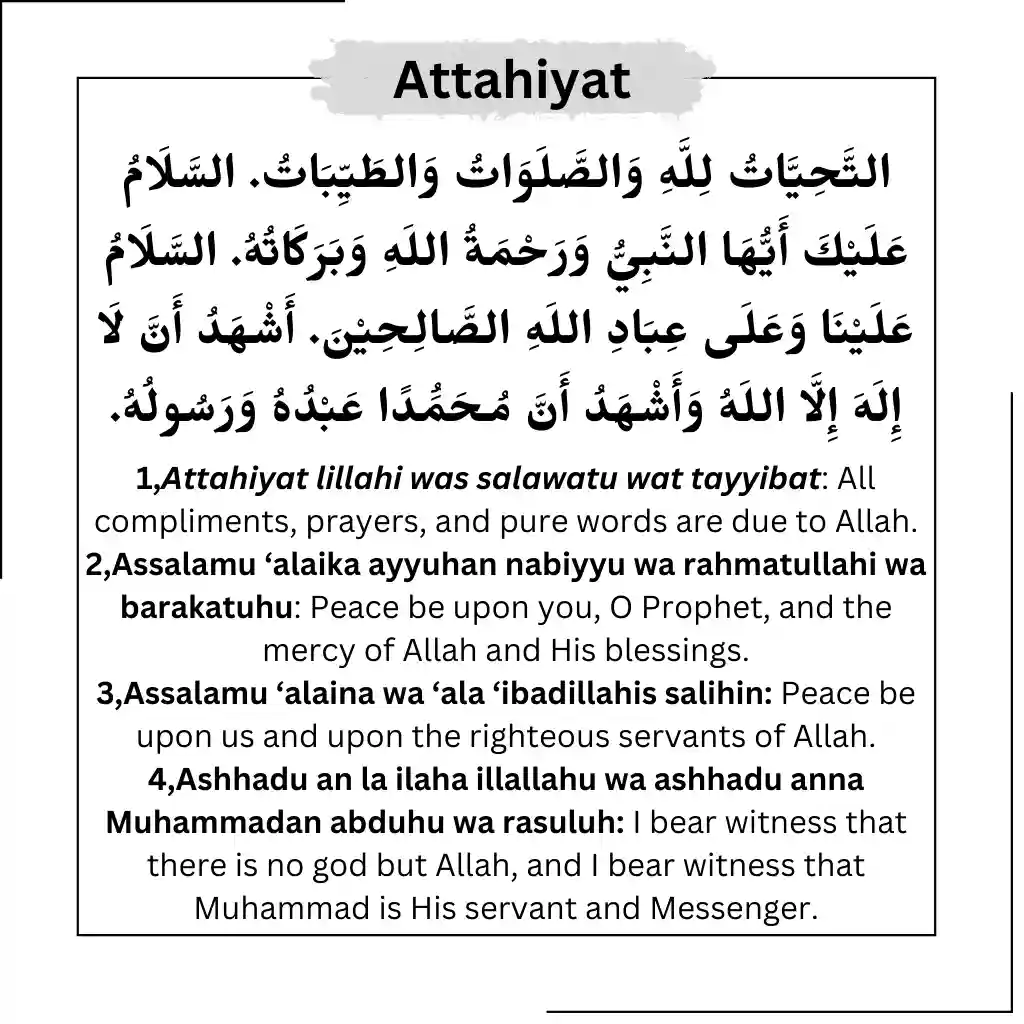Namaz, or Salah, is the cornerstone of a Muslim’s daily worship, serving as a direct connection between the believer and Allah. This sacred act of devotion nurtures the soul and strengthens faith. Among its key elements is the recitation of the Attahiyat, a powerful dua that encapsulates submission, praise, and a declaration of faith. In this article, we explore the profound meaning and significance of “Attahiyat Lillahi Wa Salawatu” through its complete Arabic text, Urdu and English translations, and a detailed breakdown of its components.
| Surah Fatiha 1st Chapter of the Quran |
| Dua For Forgiveness- Sayyidul Istighfar |
| Dua e Eid- Taqaballahu Wa Minkum |
| Ahlan Wa Sahlan Marhaba- أَهْلًا وَسَهْلًا وَمَرْحَبًا |
The Importance of Dua in Namaz (Salah)
Dua, or supplication, holds a special place in Islamic worship. It is the essence of submission to Allah, a means to seek His mercy, and a path to spiritual fulfillment. In Namaz, duas like Attahiyat Lillahi Wa Salawatu are not mere rituals but heartfelt expressions of faith and connection to Allah. These duas enrich the spiritual experience of Salah.
Attahiyat Lillahi Wa Salawatu: The Full Arabic Verse
The Attahiyat is recited in the sitting position of Salah after completing the prostrations. Below is the full Arabic text:
التَّحِيَّاتُ لِلَّهِ وَالصَّلَوَاتُ وَالطَيِّبَاتُ. السَّلَامُ عَلَيْكَ أَيُّهَا النَّبِيُّ وَرَحْمَةُ اللَهِ وَبَرَكَاتُهُ. السَّلَامُ عَلَيْنَا وَعَلَى عِبَادِ اللَهِ الصَّالِحِيْنَ. أَشْهَدُ أَنَّ لَا إِلَهَ إِلَّا اللَهُ وَأَشْهَدُ أَنَّ مُحَمَُدًا عَبْدُهُ وَرَسُولُهُ.
Translation and Explanation
English Translation
- Attahiyat lillahi was salawatu wat tayyibat: All compliments, prayers, and pure words are due to Allah.
- Assalamu ‘alaika ayyuhan nabiyyu wa rahmatullahi wa barakatuhu: Peace be upon you, O Prophet, and the mercy of Allah and His blessings.
- Assalamu ‘alaina wa ‘ala ‘ibadillahis salihin: Peace be upon us and upon the righteous servants of Allah.
- Ashhadu an la ilaha illallahu wa ashhadu anna Muhammadan abduhu wa rasuluh: I bear witness that there is no god but Allah, and I bear witness that Muhammad is His servant and Messenger.
Urdu Translation
- التحیات للہ والصلوات والطیبات: تمام تحفیات، عبادات اور پاكیزگیاں اللہ کے لیے ہیں۔
- السلام علیک ایہ النبی ورحمت اللہ وبرکاتہ: ای نبی، اللہ کی رحمت اور برکتیں اپ پر هوںیں
- السلام علینا وعلی عباد اللہ الصالحین: هم پر اور اللہ کے نیک بندوں پر سلام ہوں۔
- اشهد ان لا اله الا اللہ واشهد ان محمدا عبدہ ورسولہ: میں گواہی دیتا ہوں کہ اللہ کے سوا کوئی الہ نہیں، اور میں گواہی دیتا ہوں کہ محمد (ص) اللہ کے بندے اور رسول ہیں
Breaking Down the Attahiyat
1. Praise and Submission
The opening lines of Attahiyat establish absolute praise and dedication to Allah. This reflects a believer’s acknowledgment of Allah’s sovereignty.
2. Salutations to the Prophet (PBUH)
Sending peace and blessings to the Prophet Muhammad (PBUH) is a fundamental act of love and respect in Islam. This part reminds believers of their connection to the Prophet’s mission.
3. Universal Peace
The dua extends peace to all righteous servants of Allah, fostering a sense of unity and brotherhood among Muslims.
4. Declaration of Faith
The concluding testimony reaffirms the oneness of Allah and the finality of the Prophethood of Muhammad (PBUH), the core of Islamic belief.
Significance of Attahiyat in Salah
The Attahiyat is not merely a ritual but a spiritual dialogue. It encapsulates praise for Allah, blessings for the Prophet, and a declaration of faith, making it a powerful and integral part of Salah.
FAQs
The Attahiyat is a dua recited during Salah, praising Allah, sending blessings to the Prophet Muhammad (PBUH), and declaring faith in Islam.
Attahiyat is crucial because it combines praise, blessings, and testimony, encapsulating the essence of a Muslim’s faith and devotion.
Yes, Attahiyat can be recited outside Salah as a form of dua and remembrance of Allah and His Prophet (PBUH).
By understanding and internalizing the meaning of Attahiyat Lillahi Wa Salawatu, Muslims can enhance their Salah experience and deepen their connection with Allah. This dua serves as a timeless reminder of devotion, unity, and faith.




